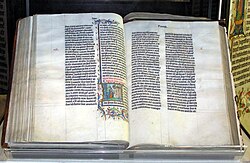| Part of a series on the |
| Bible |
|---|
 |
| Outline of Bible-related topics |
Biblical infallibility is the belief that the Bible can be relied on entirely for guidance in faith and Christian living, providing accurate and trustworthy direction for salvation and spiritual practice. [1]
Contents
- Background
- Patristic
- Denominational positions
- Catholicism
- Methodism
- Evangelicalism
- Neighboring concepts
- Infallibility and inerrancy
- See also
- References
Historically, Jewish and Christian interpreters have treated the Bible as trustworthy, though trust did not necessarily imply historical or scientific accuracy. The concept of biblical infallibility gained prominence in 19th- and early 20th-century Protestantism as a fundamentalist reaction against modernist trends in mainstream Christianity. In parallel, the Catholic Church developed the idea of papal infallibility, while evangelical churches emphasized the infallibility of Scripture. Both movements combined theological claims with ideological resistance to perceived erosion of traditional authority, reflecting a broader crisis in Western religious authority.
Early Christian writers, such as Clement of Rome, emphasized the truthfulness of Scripture, attributing its teachings to divine inspiration and highlighting the moral endurance of the righteous. Denominational perspectives vary: the Catholic Church teaches the inerrancy of Scripture in matters of salvation but requires careful interpretation of the human authors’ intentions. Methodists, following John Wesley, regard Scripture as infallibly true and authoritative for faith and practice, though not equating the Bible itself with God. Evangelical views, particularly in the U.S., often uphold both inerrancy and infallibility, while many international evangelicals focus only on God’s infallibility rather than that of the Bible.
The concepts of infallibility and inerrancy are related but distinct. Infallibility refers to the Bible’s inability to fail in matters of faith and practice, while inerrancy denotes freedom from all errors, including historical or scientific details. Some denominations allow for minor errors in non-essential historical or scientific details under infallibility, whereas inerrancy traditionally holds that all original manuscript content is fully true. This distinction has led to ongoing debates among scholars and denominations, with documents like the Chicago Statement on Biblical Inerrancy affirming that infallibility and inerrancy are closely connected but not identical, and that scientific interpretations should not override scriptural teachings on creation and divine events.